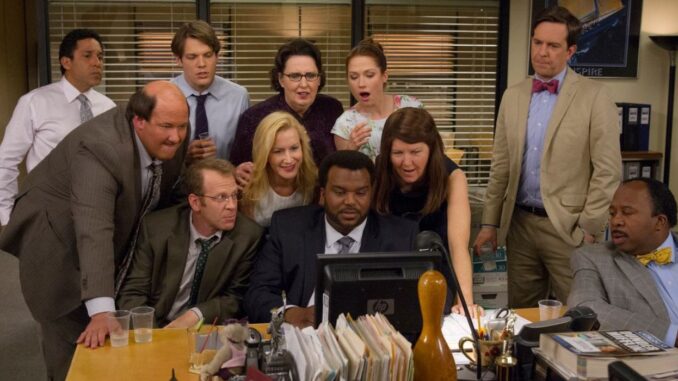
The Final Moments of The Office That Broke Our Hearts
For nine seasons, Dunder Mifflin Paper Company wasn't just a fictional workplace; it was a second home, its inhabitants a found family. We laughed with them, cringed for them, and celebrated their small victories and quiet heartbreaks. So, when the final credits rolled on "The Office," it wasn't just the end of a television show; it was the poignant farewell to a significant chapter of our own lives. The finale, "Finale," was a masterclass in emotional closure, a carefully orchestrated symphony of nostalgia, growth, and bittersweet goodbyes that collectively broke our hearts, not with tragedy, but with the profound beauty of ordinary lives reaching their deeply satisfying, yet tear-inducing, conclusion.
The initial pang of sorrow came with the realization that this was truly it, intensified by the gathering for Dwight and Angela's wedding. It was a joyous occasion, the culmination of one of the show's most tumultuous and endearing romances. Yet, woven into the vows and the Schrute traditions was the looming sense of finality. Then, a miracle: the unmistakable, heartwarming silhouette of Michael Scott stepping out of the shadows, uttering the only three words that could possibly have heralded his return: "That's what she said." This moment, rather than merely bringing joy, twisted the knife of heartbreak. It was a fleeting glimpse of the chaotic, well-meaning heart of the office, a ghost of laughter past. His absence had been palpable, and his brief return served as a powerful reminder of how much we'd missed him, and how truly over this era was, even with his perfect, Michael-esque send-off for Dwight.
As the wedding celebrations bled into the "where are they now" documentary screening and panel, the true weight of goodbye settled in. We watched the characters watch themselves, reflecting on their journeys with a newfound clarity that mirrored our own. Jim and Pam, the quiet anchor of the series, had already begun their transition, their move to Austin a brave step towards a new future. Their last shared looks, the unspoken history in their smiles, spoke volumes. It was not a grand dramatic parting, but a gentle unmooring from the familiar, showing us that love, like life, must evolve beyond comfortable walls. Pam's tearful realization at the panel, that the documentary had shown the world how much beauty existed in ordinary lives, struck a resonant chord. It was a meta-acknowledgement of the show's own thesis, and a moment that truly opened the floodgates of emotion.
But the most potent, soul-stirring moments arrived with the final pilgrimage through the deserted Dunder Mifflin office. Pam's final act of artistic expression, painting the exterior of the building that had housed so much of her life, was a powerful visual metaphor. It was her way of capturing the essence of a place that, despite its mundane purpose, had facilitated profound personal growth and forged unbreakable bonds. Her painting wasn't just art; it was a love letter to a space, a time, and the people within it. And then, the final, gut-wrenching walk-through. Kevin, Oscar, Andy, Phyllis, Stanley, Creed, Meredith – each offered a poignant, often humorous, last word, encapsulating their unique quirks and the found family they had become. Creed's simple, perfect "It was a good life," delivered with his characteristic enigma, somehow summed up the quiet satisfaction of it all.
The absolute breaking point, however, came with Pam's final, lingering gaze across the empty desks, the quiet hum of the building replaced by the silent hum of memory. Her voiceover, delivering the show's ultimate message, sealed our heartbreak in the most beautiful way imaginable: "There's a lot of beauty in ordinary things. Isn't that kind of the point?" This wasn't just a line; it was the entire ethos of the show crystallized into a single, profound truth. It validated every single minute we'd spent with these seemingly unremarkable people, reminding us that true meaning, love, and joy are often found not in grand gestures or epic adventures, but in the mundane rhythms of daily life, in shared glances, inside jokes, and the quiet camaraderie of a paper sales office. The final shot, of the camera pulling back from the illuminated "Dunder Mifflin" sign, leaving the building as a solitary beacon in the night, felt like a literal turning off of the lights on our own cherished memories.
The final moments of "The Office" didn't break our hearts through tragedy or despair, but through the overwhelming weight of beautiful, perfect closure. It was the bittersweet ache of saying goodbye to beloved friends, knowing they were moving on to new, fulfilling lives. It was the recognition that the ordinary, once observed with such love and detail, was anything but. The tears flowed not from sadness alone, but from a profound sense of gratitude for the laughter, the lessons, and the simple, ordinary beauty that had, for nine years, made Scranton, Pennsylvania, feel like home. And that, truly, was the point.